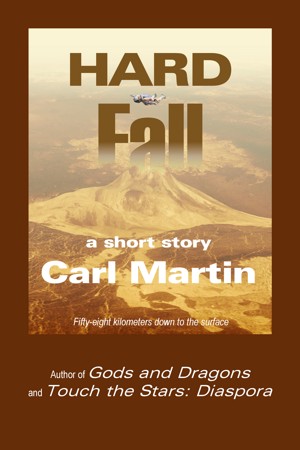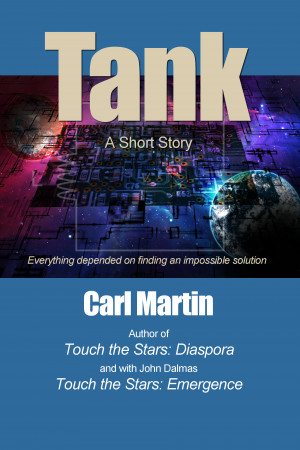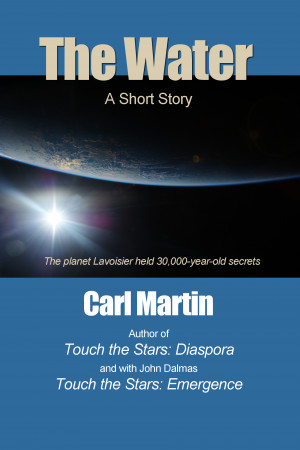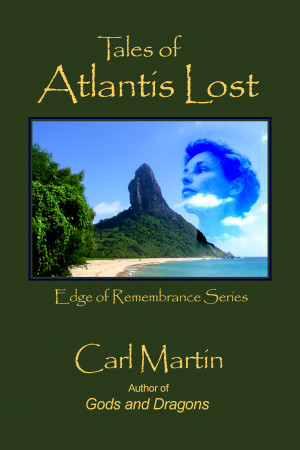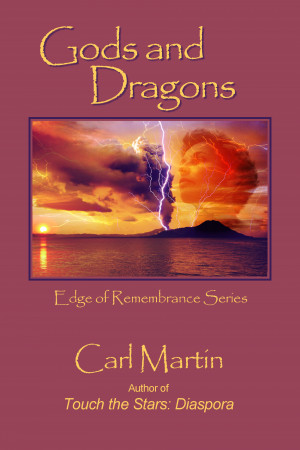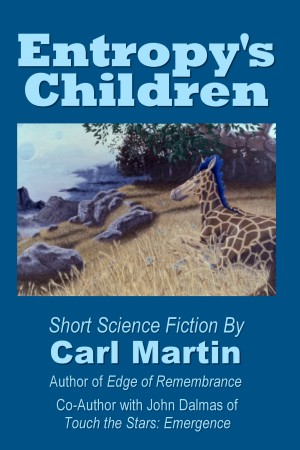Interview with Carl Martin
Published 2016-11-11.
When did you first start writing?
I wrote my first story at age 8, inspired by an old Steve Reeves movie about Hercules. In my story, "Giant Hercules," our hero throws an enchanted discus which disappears into the distance. Later, after circling the planet, the discus returns to the arena. The hero sleep walks toward the discus, growing smaller as he nears it, penetrating the side of it to appear in space, trapped amongst the stars in a block of ice. Years later, while driving on the Sunset Strip in Los Angeles, I saw a billboard with Lou Ferrigno as Hercules, half up to his waist in a block of ice, floating amongst the stars. It made me wonder if writers might be connected to one another. A delightful coincidence, whether accidental or cause-and-effect.
I was also inspired by films like "Forbidden Planet" and stories like "Wizard of Lemuria." Some of it was awful, but it all tickled an itch to explore the world of possibilities.
While living in Los Angeles, I worked as an artist doing phototypesetting, layout, illustration and even did several matte paintings for a Saul Bass short film of a Ray Bradbury short story, "Quest." Mr. Bass was a two-time Academy Award winning designer. A friend of mine, George Mather (a special effects manager on the original Star Wars) had called me on the film project.
Another friend, John Dalmas (pen name of John R. Jones), had asked if he could work with me on one of my novel projects. I jumped at the chance to work with him at a time when he was beginning to dedicate his life to writing science fiction, after a successful career as a forest ecologist. Though I didn't pursue a writing career of my own at that time, it established a solid foundation for my education as a writer.
Later, I switched from an art career to that of a software engineer, eventually finishing a degree summa cum laude. I continued to use my writing skills, but for more business-related projects. Always, I hungered to tell the tales of adventure and possible realities. A number of short stories were submitted and rejected. But I always remembered the words of one professional writer who said that the only way to learn to write is to write. After writing your first million words, you start to get an idea of what you're doing. I'm always learning, even when I'm teaching others what I've learned.
In 2012, I added several scenes to my first novel with John Dalmas (Touch the Stars: Emergence) and republished it. Two years later, I finally finished the sequel, Touch the Stars: Diaspora, and published it along with an anthology of my short fiction. Now, I have several other projects in various stages of completion.
What's the story behind your latest book?
Touch the Stars: Diaspora (TTSD) was a long time in coming. I started this sequel to my first novel as soon as the first one was published by Tor Books, in 1983. The dangers in the first book become magnified a thousand fold. The technological advances also are greatly magnified. And the heroism of Jason Roanhorse is complemented by the maturing of his eldest son, Gordon.
I never made the sequel a high priority until 1990, when I took off a few months and traveled to Thailand. I dedicated several hours each day to writing. Even with nearly a dozen screaming kids in the room, the words continued to flow. One of my favorite scenes came from that working vacation. A storm on the Gulf of Thailand, at Pattaya, the scene was so vividly compelling, my wife could not coax me to come inside as I wrote down my description of the colors and shapes in front of me. In my mind, I could see the Roanhorse starship snap into view between roiling clouds and the choppy, ice green waves of the Siamese Sea.
After that trip, the novel lay dormant and unfinished for several years. I finally finished a draft and sent off a query to Tor Books. Though the editor wanted to see my mountain of pages, his reply was a wake-up call that I still had much to learn.
About that time, I took creative writing in college, hoping to learn enough and to complete the lessons John Dalmas had started. I was always the first to lay my class creations on the hearth of criticism. The fellow students, and especially the professor, were brutal. I didn't agree with everything they said, but I listened and searched for what I had done that could elicit their reaction. Their perception mattered more to me than any ego I might protect. I was there to learn and ego be damned. I took a second semester of creative writing and learned even more. My professor convinced me to take another of his classes on opera as an art form. At first, I cringed. But after the first couple of weeks, I saw the value in learning a different form of the art of storytelling. I was so compelled by this, I took a second semester of the class, studying an entirely new set of operas. It opened my eyes in ways I never could have imagined.
My college work was focused on computer science. I had loved mathematics and logic for as long as I could remember. When my late father had worked in the space industry in the 60s, I even had helped him draw logic flow charts for his work. In the late 90s, I finally had a computer with enough power and colors to display stars the way I had always wanted to display them. I programmed a 3D star viewer, later called "Stars in the NeighborHood" (or "Stars in the Hood"). This had helped me visualize the last part of my novel, adding scenes that felt more real because I could now see the constellations from that other star system.
In 2002, I took a year off from software engineering. I had made enough money to dedicate a solid block of time writing something new. I didn't feel strong enough yet as a writer to modify what I had already written on TTSD. I felt it would be better to write something entirely new, improve my game, and then come back to Diaspora with a new level of writing skills. That's when I wrote "Edge of Remembrance." That ended up being nearly a thousand pages. I ultimately broke the story into two parts -- "Edge of Remembrance: Gods and Dragons," and "Edge of Remembrance: Tales of Atlantis Lost." Both of these take place in the same Roanhorse universe as the two "Touch the Stars" novels. The first was published in 2006 as an eBook. I'm currently adding more scenes in preparation for republishing it, hopefully in 2017.
In 2007, my computer career ended by choice and my writing took a break for matters of the heart. I found my soulmate online. Now, after more than 9 years living overseas, the bond between us has grown even stronger.
Being semi-retired gave me much more time to write. After adding a few scenes to my first novel, I finished up "Touch the Stars: Diaspora" and published it in 2014. After more than 30 years, the book was finally done.
What motivated you to become an indie author?
Being an independent, self-published author is scary. The biggest scare is not having the "safety net" of a professional publisher's hard-nosed editing insights. Publishing a story can be nerve-racking, especially a novel. That's a lot of work and ultimately you, the publisher and writer, are responsible for its success or failure.
Self-published, you also don't get a publisher's advance on royalties. That's a nice perk, but when you're into the writing for the art, the money comes in second. The money is a good validation that you're on the right track. And it's a big relief to have a publisher take on a project, but gone are the days when a writer was done when the publishing contract was signed. These days, even with a publisher, the writer is expected to market the book in ways that would have been bewildering to most writers of the 50s, 60s and 70s.
I like to take risks artistically. Most publishers these days are not in the mood for risks. They want safe projects. I gave up "safe" ages ago.
What is the greatest joy of writing for you?
Sculpting words to create a feeling. Sculpting paragraphs and pages to create a reality.
Building worlds is part "love affair" with words. Finding the right words and right sequence of words is always a challenge. There are an infinite number of ways to do it poorly, and an equally infinite number of ways to create something that grabs the reader by the neurons and shakes them to the core of their being. That is the desire that drives me. The greatest joy is realizing at least a part of that drive.
This requires accuracy of language and precision of ideas. But it needs to be done in a way that is seamless to the reader. I learned in one professor's book on rewriting the desirability to "show" instead of "tell" a detail, but also the far better need to "imply" a detail so that the reader effortlessly creates that detail in their own mind. This is when the magic happens.
What do your fans mean to you?
I could say that "fans are why I write," but that would be a little too self-serving. Every writer wants to have fans who appreciate their writing. That's a given. But it's also an extension of ego. I learned long ago that ego can get in the way of creating.
The relationship between a writer and a reader has to be one of mutual respect. The writer needs to be true to his art, but he also needs to impart that creation to the recipient of that communication. And all art is communication, or it is nothing.
A fan is merely a reader who connects with that communication on a deeply visceral level. The writing means something important to them. As a writer, I value and respect the opinions of others, even if I disagree with them. They have their experiences and those mold their worldview. It's quite possible that they are not my audience. Maybe they are. But fans are the ones with whom I've already built a trust. I must maintain that trust by staying true to my art. Some may not see this need on my part. If I break their reality of me, I may lose a fan, but I hope my integrity remains intact. One day, they may come to realize my chosen path for what it is. They may come back as a fan, realizing that either I was true to myself, or that I was open enough to see I was wrong and to grow beyond those former limitations.
A fan is an individual with hopes and dreams, just like everyone else. If my art speaks to them, I know I'm doing something right.
What are you working on next?
At the moment, this November 2016, I'm finishing up a novel I originally started in 2002. That project was so large, I split it into two books.
The first book, "Edge of Remembrance: Gods and Dragons" is a story about two archaeologists separated by more than 11,000 years. Merla Velzna was born into the Military Class of old Atlantis and helped refugees escape from the horrors that night 9620 BC when their homes were swallowed by the sea -- victims of global warming. She had become a scientist by choice, after the Empress had recognized Merla for her profound services to her empire. But now, she needed to put her skills as a commander back to work to save what remained of civilization -- 6,000 years before our own history began.
Gunter Jürgens was an archaeologist of the near future. His excavation in Central America turned the archaeological world on its head by unearthing evidence of old Atlantis -- evidence left by Merla Velzna.
The book alternates between Merla's world and Gunter's. It all takes place in the same universe as Jason Roanhorse of my "Touch the Stars" series. Merla is faced with betrayals, disasters and the obvious hardships of all refugees. Gunter is faced with arrogance from some of his peers, politics, sabotage and subterfuge. But Gunter finds in Jason Roanhorse an ally with the guts, wisdom and resources to ensure that Gunter's discovery does not get lost in the political firestorm which results.
Who are your favorite authors?
Perhaps too many to name them all. I get inspiration from just about everything I've ever read and everyone with whom I've held a conversation. I'm constantly hungry to learn from whatever source. Even the poor authors with less-than-perfect writing styles have taught me wonderful lessons. I have many different types of favorites.
For sheer enjoyment, I've loved the writing of Heinlein, especially his earlier works. Some of his later stuff had elements that were precious, but had other elements that seemed too plodding. I loved, for instance, the first half of "Stranger in a Strange Land." I felt the same way about "Number of the Beast." Books like "The Puppet Masters," "Sixth Column," "Glory Road" and "Orphans of the Sky" are my favorites of his.
I have been greatly influenced by the works of James Blish, Arthur C. Clarke (especially "Childhood's End," and his short story, "The Star"), Robert Silverberg ("Roma Eterna" was deeply insightful), L. Ron Hubbard ("Slaves of Sleep" and "Battlefield Earth"), and even Douglas Adams ("The Hitchhiker's Guide to the Galaxy"). I have also loved the work of Isaac Asimov (both fiction and non-fiction, especially the Foundation Trilogy, and his "Planets for Man"), David Brin ("Startide Rising" and "Uplift War"), E.E. Doc Smith (Lensmen Series), Frank Herbert ("Dune"), H.G. Wells ("Time Machine"), Orson Scott Card ("Ender's Game"), Philip Jose Farmer ("The Gate of Time"), Tom Purdom ("Tree Lord of Imeten"), Larry Niven ("Ringworld" and "The Mote in God's Eye" [with Jerry Pournelle]), and Ursula K. Le Guin ("City of Illusions," "Left Hand of Darkness" and "The Dispossessed").
Outside of science fiction, I also love the work of Jared Diamond; his "Guns, Germs and Steel" was full of insights. Admiral Richard E. Byrd's "Alone" deeply moved me with his courage in Antarctica. Daniel Goleman's "Emotional Intelligence" opened up new ideas to me that broadened not only my conceptual palette, but also my emotional understanding, as well. David Madden's work, "Revising Fiction," taught me more about writing than any other single work. Marshall T. Savage's "The Millennial Project: Colonizing the Galaxy in Eight Easy Steps" inspired me in numerous ways. And the Kabbalist authors of the Bible have given men much to ponder about the wisdom hidden in that great book.
What are your five favorite books, and why?
Ouch! I have so many favorites and they depend on my mood and my current passion. Whew! Whittling down a list to all around top five is not easy. But here goes...
The Bible. Why? Stories! This baby is packed with them, but something far more. It contains a lot of hidden wisdom and layers of meaning that keeps on giving. I doubt if I'll ever run out of discoveries by reading and re-reading this book.
I know it's not a "book," but Arthur C. Clarke's short story, "The Star" is one that inspired me to write my own story, "The Water" ("Entropy's Children"). Whatever book contains "The Star," I like it because of this one gem. Clarke's powerful story told how a Jesuit was humbled by science. My own short tells how a scientist is humbled by a biblical story, reversing the roles of science and religion from Clarke's award-winning short.
Heinlein's "Sixth Column" because it gives so many ideas about technological discovery in times of war. It shows how being unreasonable can make all the difference between winning and losing. This inspired my short story, "Tank" ("Entropy's Children").
Herbert's "Dune" because he built a full-blown world with precious details that worked. He made some serious errors from a scientific viewpoint, but these are lost by the sheer power of his cohesive universe. These details inspired, in part, the work I put into "Touch the Stars: Diaspora," and some of the details I'm including in my next novel, "Edge of Remembrance: Gods and Dragons."
Asimov's "Foundation Trilogy." There is so much to like in these three stories. All three are in one book in the edition I bought years ago. Not only did Asimov's imagination invest my own imagination for story telling, but idea of Hari Seldon's plan to shorten the galactic Dark Ages has powered some of my own non-fiction writing (pen name Rod Martin, Jr).
Describe your desk
I used to write everything by hand and then to type it on an old manual typewriter. Yes, I used to have one of those. Then, I got myself an IBM Selectric, secondhand. These days, my desk is dominated by my computer monitor, bottle of water and mouse pad.
Behind the monitor, I prop up my portfolio notepad which I take with me almost everywhere. Ideas pop out when I least expect them. Beside my desk is a small bookshelf with books important to my current projects. Right now, they include: Chicago Manual of Style, Emotional Intelligence (Goleman), Alone (Byrd), Physical Climatology (Landsberg), General Climatology (Critchfield), The Everything Creative Writing Book (Whiteley), Astronomy Data Book (Robinson, Muirden), and Planets for Man (Dole, Asimov).
Where did you grow up, and how did this influence your writing?
Frankly, I'm still growing up. In other words, I'm still a kid at heart (most of the time). As a biological kid, I grew up in West Texas. Out there, we had wide open spaces and big skies. At least that's how they seemed compared to Washington, DC and later Los Angeles.
Space and desolate (semi-desert) landscapes gave me a feel for adventure and rugged individualism. Though I wasn't personally challenged to any extreme by the environment, there was enough nature and harshness to make me appreciate what civilization does for us. I might not have felt that as much if I had grown up in a far larger city like L.A., D.C. or New York.
When the first Star Wars movie came out, I lived in Los Angeles. The scenes with Luke Skywalker on Tatooine connected with me on a deeply visceral level. They reminded me of my days growing up in West Texas and the Monahans sand dunes, dreaming of flying to other worlds much as Luke wanted to do.
Smashwords Interviews are created by the profiled author or publisher.
Books by This Author
Hard Fall
by Carl Martin
(4.00 from 1 review)
A Short Story: Teenager, Jerry Xiàng had always skimped on the safety rules of his family’s dirigible farm, high in the skies of Venus. Today, bad luck caught up with Jerry in the form of a meteor. Suddenly, he found himself hurtling toward the scalding, hot surface of Earth’s sister planet. What he learned on the way down could prove even more dangerous than his own hard fall.
Tank
by Carl Martin
Short story about a much needed breakthrough. If the scientists didn't get this right, they would lose the war. And losing meant death for all of humanity. The enemy didn't want to conquer; they wanted to annihilate. Welcome to the 32nd century. Humanity had already spread to the stars, but this new competitor wanted to disinfect every human planet.
The Water
by Carl Martin
The planet Lavoisier was 93% ocean. Everything seemed pleasantly wonderful about this water world until scientists discovered Delphinus capensis swimming in those alien seas, 49.3 light years from home.
In this short story, the 30,000-year-old secrets held by that planet were enough to give one scientist a crisis of uncertainty.
Tales of Atlantis Lost
by Carl Martin
Tales of Atlantis Lost is book two of Edge of Remembrance. It includes ancient technology, intrigue, murder, deception, super technology, space travel, terraforming another world, and more. Gunter Jürgens discovers he has an intelligent and attractive fan who will not go away. Merla Velzna faces her greatest challenge since the destruction of her homeland.
Gods and Dragons
by Carl Martin
“Merla Velzna had earned the right not to kill. No one else born into the Military Class had ever gained her advantage—the freedom to choose her own destiny. For eight years, digging for artifacts had given her peace. Now, for the first time in more than a decade, her military training was once again active in mind and body. Someone was following her....”
Entropy's Children
by Carl Martin
Twelve tales of short science fiction meant to challenge your mind. From a brave soul at the end of one universe to a brave soldier a thousand centuries beyond the end of our own history, these tales stretch your intellect. If you remain humble, you might see something entirely new. Entropy's Children will leave you with a new appreciation for the universe in which we live
Touch the Stars: Diaspora
by Carl Martin
Part 2 of Touch the Stars. The sinister Hamilton Club has gained an alien ally named Vormin Kark. With the alien's super technology, Roanhorse Aerospace and the rest of humanity don't seem to stand a chance. But Jason Roanhorse finds his own helpful aliens, plus an elder son who comes of age to help battle the forces of evil.
Touch the Stars: Emergence
by John Dalmas & Carl Martin
Conspiracies do exist and they are far more common than you might realize. When Jason Roanhorse and his aerospace company discover a faster-than-light drive, he attracts the attention of the ultra-secret Hamilton Club, a group of the world's most powerful. The Hamilton Club is bent on global conquest and the Roanhorse discovery could jeopardize their plans. Roanhorse has to be stopped.

